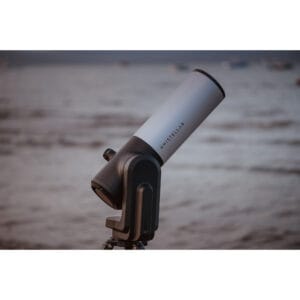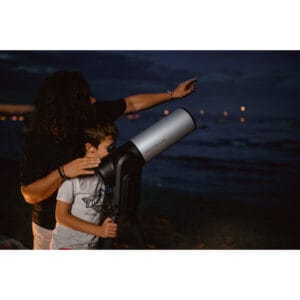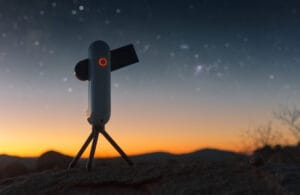Imagine: you point your telescope at a dark starry sky, ready to capture the Andromeda Galaxy. But instead of the spectacular images you see online, you get a photo full of noise with little detail. This isn’t unusual, even for experienced astrophotographers. This is where stacking – a powerful technique – comes into play.
Stacking combines multiple photos of the same object to create one crystal-clear image. It enhances details and removes noise, revealing the beautiful structures of galaxies, nebulae, and the moon. While the process sounds complex, smart telescopes like the Vespera II, Vespera Pro, and Hestia make stacking more accessible than ever.
How Does Stacking Work?
Stacking is similar to creating a painting in layers. Each layer (or photo) adds detail and clarity while removing unwanted elements like noise. The process consists of three steps:
- Capturing images
Smart telescopes like the Vespera II automatically take dozens of shots of an object. These telescopes optimize settings like exposure and ISO to capture as much detail as possible. Even when photographing from a light-polluted city, the results remain impressive. - Aligning the images
Because the Earth rotates, consecutive shots are often not exactly aligned. Thanks to built-in technology, smart telescopes automatically correct these deviations. This saves hours of work with complicated software. - Combining and processing
The software of telescopes like the Hestia and Vespera Pro combines the images directly. The result? A single image you can view and share via your smartphone or tablet.
Why is Stacking Essential?
Astrophotography comes with challenges. Objects in space are often faint light sources, and noise can hide details. Stacking solves this problem by amplifying light signals and removing interference.
With stacking, you can:
- Capture the moon in sharp detail, including craters and valleys.
- Photograph galaxies, like Andromeda, with impressive detail.
- Enhance nebula colors, like the Orion Nebula.
Without stacking, capturing such objects would be almost impossible, especially for beginners.
Smart Telescopes: your Help in the Process
In the past, stacking was mainly reserved for professionals with complex software. But telescopes like the Vespera II, Vespera Pro, and Hestia have completely changed this. These telescopes do all the heavy lifting.
- Automatic capture and processing: With one button press, all images are automatically stacked.
- User-friendly interface: View and share your final result directly via an app.
- Accessible for beginners: No technical knowledge needed – the telescope does all the work for you.
What Do You Need to get Started?
Excited to try stacking yourself? Here are some tips to get started:
- Choose the right telescope: Smart telescopes like the Vespera II or Hestia are perfect for stacking thanks to their built-in technology.
- Choose your object: Start with the moon or bright nebulae like the Orion Nebula. These objects are easy to photograph and produce impressive results.
- Plan your session: Check the weather and choose a location with minimal light pollution.
Conclusion: an Essential Technique
Stacking has transformed astrophotography. It enables you to create beautiful images, even if you’re not an experienced photographer. Smart telescopes like the Vespera II, Vespera Pro, and Hestia make this technique simpler and more accessible than ever.
Want to take your astrophotography to the next level? Visit our webshop and discover how smart telescopes can enrich your stargazing experience. Start creating spectacular images today!




